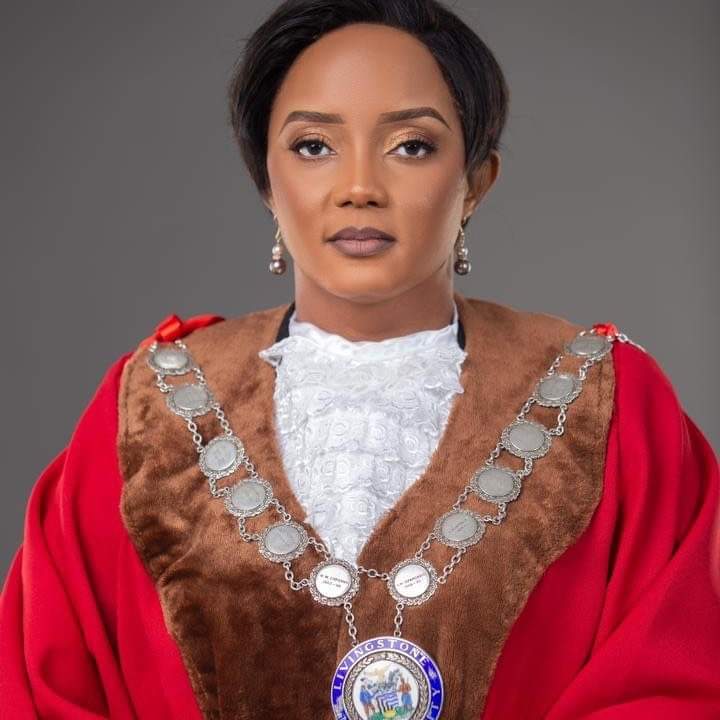CDF must increase pupil access to computers, prods Mayoress Constance Muleabai
Notice: Undefined index: catFilterList in /home/zambi/public_html/wp-content/plugins/wp-likes/api.php on line 243

CDF must increase pupil access to computers, prods Mayoress Constance Muleabai
By Chali Mulenga
LIVINGSTONE City Mayoress Constance Muleabai has urged schools in her city to apply for the Constituency Development Fund (CDF) in order to enhance their digital infrastructure.
Ms. Muleabai emphasized that just as schools were encouraged to increase the number of desks, they should equally prioritize increasing the availability of computers in schools.
Mayoress Muleabai highlighted the government’s commitment to improving digital infrastructure in schools and expressed concern over the limited number of functioning computers at Mulwani School.
Speaking at the launch event held at Mulwani Combined School, Mayoress Muleabai commended Development 360 for their efforts in promoting digital rights and skills through the “Right to Click or Not to Click” project. Mayoress Muleabai explained that the project aimed to address the challenges faced by learners in accessing and effectively utilizing digital technologies.
Mayoress Muleabai acknowledged the significant positive impact that technological advances have had on various sectors, including education, health, security, finance, and agriculture.
Mayoress Muleabai recognized that these advances have greatly improved learners’ access to internet-based resources, ultimately enhancing their learning outcomes.
However, Mayoress Muleabai acknowledged the challenges faced by the education sector and other government ministries in effectively using these technologies.
Mayoress Muleabai highlighted the impact of the COVID-19 pandemic, which resulted in a substantial portion of missed learning opportunities for pupils across the country.
Mayoress Muleabai mentioned challenges such as inadequate information communication technologies, insufficient training for teaching staff in online teaching, lack of or poor internet connectivity in rural areas, high costs of computers and internet-related equipment, poor infrastructure, and high data costs.
Mayoress Muleabai stressed that these challenges present an opportunity for the government to invest in technologies that would unlock Zambia’s economic potential and improve its global performance.
Mayoress Muleabai highlighted notable technological plans and investments made by the government, including the launch of the HH Innovation Fund and the agreement with Liquid Telecoms to provide high-speed internet.
Mayoress Muleabai commended Development 360 for their efforts in promoting digital rights and raising awareness, urging other civil society organizations in Livingstone and across the country to follow their example.
Mayoress Muleabai assured them of the government’s support for innovative projects aimed at improving the welfare of citizens, especially young people.
Mayoress Muleabai emphasized the importance of digital skills and education, the government’s commitment to citizens’ rights, and the need for collaboration between government, civil society, and the private sector.
However, Mayoress Muleabai acknowledged challenges faced by the education sector and other government ministries in effectively using these technologies.
Mayoress Muleabai highlighted the impact of the COVID-19 pandemic, which resulted in a substantial portion of missed learning opportunities for pupils across the country.
Mayoress Muleabai mentioned challenges such as inadequate information communication technologies, insufficient training for teaching staff in online teaching, lack of or poor internet connectivity in rural areas, high costs of computers and internet-related equipment, poor infrastructure, and high data costs.
Mayoress Muleabai stressed that these challenges present an opportunity for the government to invest in technologies that would unlock Zambia’s economic potential and improve its global performance.
Mayoress Muleabai highlighted notable technological plans and investments made by the government, including the launch of the HH Innovation Fund and the agreement with Liquid Telecoms to provide high-speed internet.
Mayoress Muleabai commended Development 360 for their efforts in promoting digital rights and raising awareness, urging other civil society organizations in Livingstone and across the country to follow their example.
Mayoress Muleabai assured them of the government’s support for innovative projects aimed at improving the welfare of citizens, especially young people.
Mayoress Muleabai emphasized the importance of digital skills and education, the government’s commitment to citizens’ rights, and the need for collaboration between government, civil society, and the private sector.
Chris Lubasi, the executive director of Development 360, highlighted the initiative’s focus on educating young individuals about the potential consequences of sharing personal information online without consensus.
Mr. Lubasi emphasized the importance of protecting privacy and fostering responsible digital citizenship among young people.
Lubasi emphasized the need for digital skills and literacy to navigate the online realm responsibly, encouraging critical thinking, evaluation of information sources, and understanding the implications of online actions.
Jaffa Malawo, the Livingstone District Education Standards Officer for open distance learning, echoed the importance of projects like the “Right to Click or Not to Click” project in improving grades, connecting with the world, protecting digital rights, and staying safe from online exploitation. Malawo called upon other civil society organizations to emulate these efforts in ensuring that citizens, especially young learners, understand their digital rights when using internet-enabled devices.
Malawo emphasized the importance of collaboration to create a safer and more supportive online environment for young people.






















